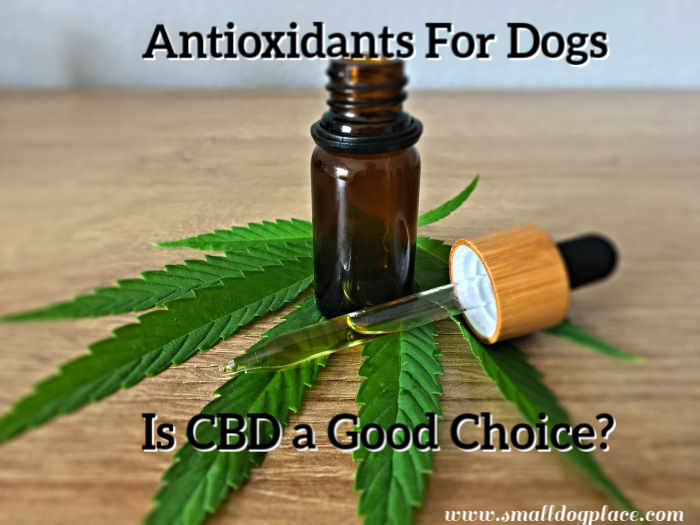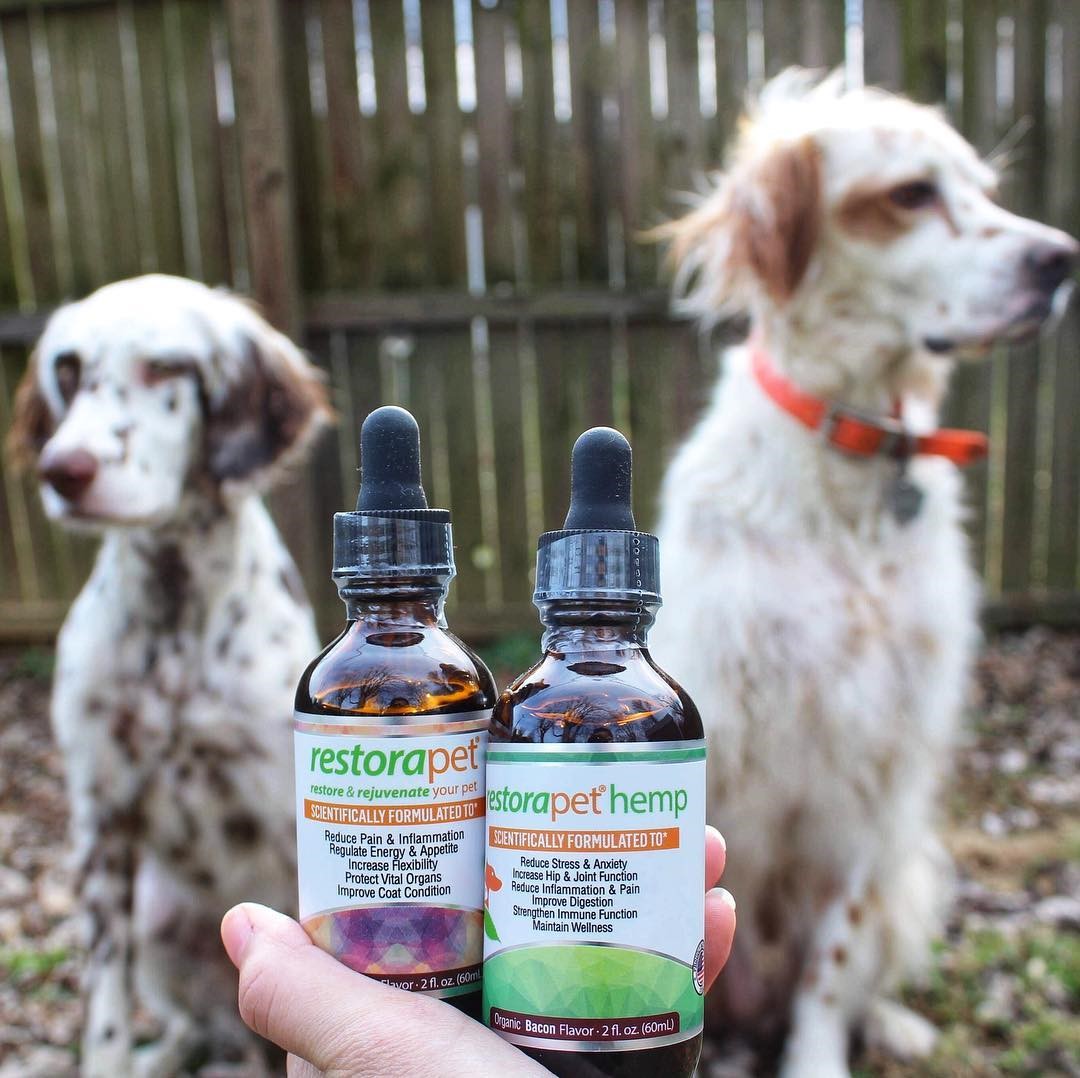CBD as Antioxidants for Small Dogs By Brian Larsen |Updated 04-10-2023
If you’re stumbled upon this article, I’m guessing you are a health conscious dog parent? Yes?
Perhaps you are looking for something new to help your aging dog? Yes?
Perhaps you are just curious about what all the hype is about CBD oil?
If you answered yes to any of the questions, above, you’re in the right place.
 CBD as Antioxidants For Small Dogs
CBD as Antioxidants For Small DogsMany Americans own dogs they love and adore. In fact, a lot of them treat dogs as part of the family.
If you have a four-legged best friend at home, then you know pretty well what we are talking about.
Our love for our furry friends can overwhelm, and that they show appreciation in everything that we do for them just makes us fall in love with them even more. So, we pamper them by giving them delicious food and treats, along with tons of cuddles and kisses.
But, aside from these, are you also giving your dogs supplements to ensure that they are always at their best?
As a dog owner, it is your job to guarantee that your dog is always in tip-top shape. Aside from choosing nutritious food and healthy treats, do you splash money into getting your dog supplements, such as antioxidants.
Antioxidants and Dogs
 CBD as Antioxidants
CBD as AntioxidantsOxygen is the air that we and our pets breathe, but do you know that too much of it can shorten one’s life?
Lack of oxygen can lead to tissue damage, and our poor pet’s lives might be compromised. However, too much oxygen forms free radicals that can poison cells. Your pet can never win here unless you make sure that they have the right oxygen level in their system.
What are Free Radicals?
Free radicals harm the body as they roam around freely, searching for a partner. These molecules are formed during energy conversion.
Unfortunately, your fur baby becomes more susceptible to developing free radicals when exposed to air pollutants such as smoke. Free radicals sustain themselves by borrowing electrons from healthy cells.
Unfortunately, they do so with no intention of ever returning what they commandeered. What happens next is oxidation, a chain reaction where cells steal electrons from other stable cells until it destroys the cellular system.
The stress caused by oxidation can harm your pet’s DNA. With this change, he is likely to encounter conditions like cardiovascular disease and cancer. Permanent oxidation can damage the nerves for good, so we know free radicals cause neural problems.
So, What Exactly are Antioxidants?
Antioxidants are substances that work in and outside of the cells of the body by protecting cell membranes from the damaging effects of highly reactive molecules called free radicals.
These substances are either made by the body or found in the food we eat, or nutritional supplements we take. The same is true for our dogs.
How Can Antioxidants Help Dogs?
Antioxidants fight off free radicals. Your pooch is capable of producing antioxidants to prevent any potential damage. However, as he grows older, the supply of antioxidant becomes less. Free radicals will outnumber the antioxidants eventually, causing your pet’s aging process to advance.
Experts recommend a particular antioxidant that can hit pause on your pet’s age and lower the odds of developing cell-related and nerve-related diseases. This antioxidant is known as cannabidiol or CBD.
What is CBD?
CBD is a safe and cheap way to resolve behavioral issues and other health problems of your dog. Compared to traditional drugs, CBD is usually more effective.
When CBD was introduced in the market as a natural remedy, it quickly became a 2-billion industry. Majority of the industry, however, comprises CBD used as home remedies for dogs.
Unfortunately, not a lot of pet parents are keen to give CBD to their little babies due to a lack of understanding in its mechanism of action.
CBD as Antioxidants for Small Dogs: Does it Work?
CBD differs from medical-grade cannabis because the former has no psychoactive properties and only possess 0.03% of tetrahydrocannabinol at most.
This chemical compound works well with the endocannabinoid system to provide overall protection and nourishment. All vertebrates, including mammals, have an ECS, which is a network of receptors and cannabinoids. It is partly responsible for pain, appetite, and appetite management and homeostasis maintenance.
The body can produce cannabinoid receptors on its own. However, it may require help from time to time. According to the National Center for Biotechnology Information, CBD oil can help in such situations, and it has been proven effective for both pet owners and their cuddle buddies.
When your pet receives CBD, CB2 receptors are activated, protecting your neurological cells. In turn, the number of free radicals lowers, and oxidative stress becomes reduced. The best part is that CBD oil also works to improve the existing free radical damage.
As your pooch gets older, brain elasticity weakens and nerve signals decrease. Oxidative stress can lead to dementia and other cognitive issues. With CBD’s neuroprotective properties, progression can be inhibited.
Using CBD oil and other antioxidants revives neurons and support their development. No more need to worry about possible degenerative myelopathy, including the paralysis it is often associated with.
Using CBD as Antioxidants on Small Dogs
Phytocannabinoid is the CBD intended for dog use. When administered to your canine friend, it can enhance his body’s production of cannabinoids.
There are many types of CBD oil for any dog size. So wary dog owners will feel at ease since they can be sure they are giving their dogs the right dose. In fact, some CBD oil formulations are suitable for smaller pets, such as cats.
These days, official dosing guidelines for dog usage of CBD is yet to be established. But, as a general rule, you can use 0.2 mg/mL daily of CBD in every pound of your dog’s weight. You can start lower than this amount and gradually increase the dose. Just observe your dog’s response to the supplement.
If your dog’s body weight changes, there is no need to up the amount. Tolerance is rare with CBD. Use this formula:
YOUR DOG’S BODY WEIGHT (in pounds)
X 0.2 = mg/ml of CBD daily
Different Forms of CBD
CBD for dogs come in different forms, namely oil, oral spray, topical spray, tinctures, balms, and dog treats.
Which one is the best you ask? Well, the answer is subjective. The best one is the one your dog likes the most. But, here are a few general guidelines that can help you figure out which can benefit your dog the most:
Balms are great for dogs with arthritis. You can give them a massage while giving them the dose.
For daily use, however, CBD oil is the most practical choice.
We can use sprays for emergencies such as when your dog gets anxious suddenly.
Pet owners may prefer using tinctures in the beginning while figuring out the right dose.
Important Tips to Keep in Mind when Using CBD as Antioxidants for Your Dog
Below are some tips that can help you find reliable CBD products:
- Choose only products intended for dogs.
- Search for products that have accreditation or third-party testing. You will know through their certificates.
- Check the ingredients list. There might be other ingredients your dog will not react well to. For instance, if it lists the oil as a component, remember your dog digests olive oil better than coconut oil.
Other Uses of CBD
As an Anti-Anxiety Medication
CBD oil prevents your dog from dealing with anxiety. Some dogs become rattled and problematic when they hear loud noises. CBD is a great solution since it has been observed to reduce anxiety in humans. According to the National Institute on Drug Abuse, CBD reduces anxiety problems in both healthy and highly anxious individuals. More about using CBD to treat anxiety in small dogs.
As a Pain Reliever
Cannabinoids found in CBD is excellent in pain management. Not just good, it is great. Too fantastic that scientists are mulling over adding it as a new drug category for chronic pain. CBD oil for dogs in pain can relieve soreness related to nerves, general inflammation, and inflammation of the pancreas and intestines.
As a Treatment For Colitis
Several studies have shown that CBD is beneficial in treating colitis and restoring the healthy gut flora of people who have bowel disease. CBD has outstanding antibiotic properties that can rid your pet’s body off certain bacteria, including the highly resistant MRSA.
As a Treatment for Autoimmune Diseases and Chronic Inflammation
Inflammatory cytokines are linked to numerous health problems, such as hypersensitivity and autoimmunity. Your dog can also benefit from the inhibition of inflammatory markers that CBD can do.
As An Appetite Stimulant
Sometimes dogs can be challenging to feed. For such problems, giving CBD to your dog is a good idea. CBD products are known to increase appetite. At the same time, it also helps reduce nausea and vomiting when your dog is under medication.
As A Cardiovascular Supplement
Heart health is not only a leading problem for humans. Dogs also suffer from heart disorders ranging from irregular heart rate, damaged blood vessels, and increased blood pressure.
How To Ask Your Vet About CBD
 How to Ask your Veterinarian about CBD and how CBD as antioxidants can help your small dog.
How to Ask your Veterinarian about CBD and how CBD as antioxidants can help your small dog.Bringing up the subject of CBD with your vet is not at all tricky. Some owners go back and forth about in fear of being judged. However, CBD is safe and legal. If you feel confident about it, then go for it, but it is essential to keep your dog’s vet in the loop.
CBD oil is linked to numerous controversy, associating it with psychoactive drugs. Some vets steer clear of the topic for beliefs rooted in stigma.
Step 1:
Discuss the use of CBD oil with an open mind. Talk to your vet and explain the reasons you think your dog can benefit from the use of CBD oil as an antioxidant. You can do your research and show him some facts that prove CBD is THC- free. Try to explain the link between CBD oil and ECS.
Step 2:
Your vet knows your dog’s physiology better than you. Ask him about his reservations (if he has any) of using CBD oil. Ask the possible adverse effects that your dog might experience from the problem.
If your doctor is still hesitant about, you could risk it and go ahead with your planned use of CBD oil. However, if you would rather play it safe, here are a couple of other antioxidants that the vet is likely to recommend.
Other Natural Antioxidants
Astaxanthin: A member of the carotenoids, astaxanthin comes from the micro-algae that shrimps, flamingos, and salmons love to eat. Guess what they have in common? They are all pink. Astaxanthin is said to be 65 times more potent than vitamin C. Pretty impressive.
Small Dog Place suggests…
Phytoplankton
Instead of handing your dog potentially dangerous fish oils, shift to phytoplankton as his source of omega-3 fats. It rids the body of toxins and heavy metals.
Other benefits include a boosted immune system, a healthy digestive tract, improved liver function, increased stamina, and allergies.
Small Dog Place suggests…
Green Tea:
But wait, what about the caffeine in it? Then, go for decaf. Green tea has catechins, which support the immune system and reduces inflammation. These are also helpful in protecting brain function and lower the chances of contracting cancer.
Small Dog Place Suggests…
Colostrum:
This is a helpful substance that boosts a newborn’s immunity. Its anti-oxidative properties can relieve your dog’s allergies, joint pain, and leaky gut syndrome. Additionally, it speeds up wound healing and fights cancer cells.
Small Dog Place suggests…
Final Thoughts on CBD as Antioxidants
Antioxidants are essential in ensuring your dog remains healthy during his advanced years. Using CBD as an antioxidant casts doubts on many people, but CBD is generally safe so long as you do your research before purchasing a product.
 CBD as Antioxidants for Small Dogs
CBD as Antioxidants for Small DogsAbout the Author of CBD as Antioxidants for Small Dogs
Brian Larsen is the Co-Founder and
CEO of RejuvaPet, LLC — the creator of RestoraPet and RestoraPet Hemp. He spent
nearly 10 years developing these products to rehabilitate and protect pets at
the cellular level, for a vastly improved quality of life.
Does This Article Deserve Your Thumbs Up?
We always appreciate your support and encouragement. Your thumbs up means so much to us. Please like this article.
If you find this page or any page on Small Dog Place Helpful, or Useful in anyway, I’d love it if you would click the small heart found on the bottom right of each page.
You can also share or bookmark this page — just click on the:

Free Monthly Newsletter
Sign Up for Our Free Newsletter and get our Free Gift to You.
my E-book, The Top 10 Mistakes People Make When Choosing a Dog (and how to avoid them)


